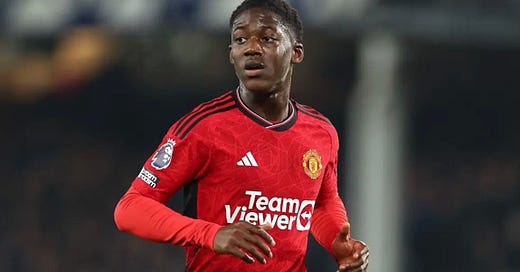Manchester United have announced financial results for Q3 of 2023/24, incorporating the first nine months of the season (July 2023 to March 2024).
Although very few clubs publish quarterly accounts, there were still some interesting messages in United’s figures, particularly as this period included the official confirmation of the deal whereby Sir Jim Ratcliffe’s INEOS acquired a 27.7% stake in United via Trawlers Limited.
Although this is only a minority stake, Ratcliffe now has control of the football operations, resulting in many changes in the leadership team, including a new chief executive Omar Berrada, who has moved from rivals Manchester City, and a new CFO Roger Bell, who held the same role at INEOS.
Closer to the pitch, Dan Ashworth has been snapped up from Newcastle United as sporting director, while Jason Wilcox has been brought in from Southampton as technical director.
United’s fans will certainly be looking for improvement under the new regime, as the club finished a relatively low eighth in the Premier League last season, which was the club’s worst position since 1989/90, also ending up with a negative goal difference. In addition, they finished rock bottom in their Champions League group with just four points.
The one bright point last season came when United deservedly defeated Manchester City to win the FA Cup for a 13th time, thus qualifying for the Europa League.
Despite the somewhat underwhelming performances, the club has recently triggered a one-year extension to Erik ten Hag's contract to keep him as manager until 2026.
Overview
Manchester United’s pre-tax loss for the first 9 months of 2023/24 nearly tripled from £31m to £89m, despite revenue increasing by £39m (8%) from £481m to £520m and profit on player sales almost doubling from £16m to £31m.
However, this was accompanied by operating expenses rising £79m (16%) to £587m, while net interest payable also increased by £32m from £20m to £52m.
The revenue growth was driven by the return to the Champions League, which meant a large increase in broadcasting, up £39m (27%) from £144m to £183m, and to a lesser extent match day, up £3m (3%) from £101m to £104m.
This was partially offset by lower commercial, which fell £4m (2%) from £236m to £232m.
Investment in the squad led to increases in wages, up £32m (13%) from £245m to £277m, and player amortisation, which rose £15m (12%) from £126m to £141m. In contrast, other expenses fell £10m (8%) from £125m to £115m, though depreciation was up 17% to £12m.
Costs included £40m of exceptional items, mainly linked to the sale of part of the club’s shareholding to Ratcliffe, which had a significant impact on the bottom line. Nevertheless, even if these once-off charges are excluded, United’s pre-tax loss would still have widened from £31m to £49m.
The impact of interest payable on United’s accounts is also clearly evident, amounting to a hefty £52m in the first 9 months, which represents a significant increase over the previous periods.
Keep reading with a 7-day free trial
Subscribe to The Swiss Ramble to keep reading this post and get 7 days of free access to the full post archives.






